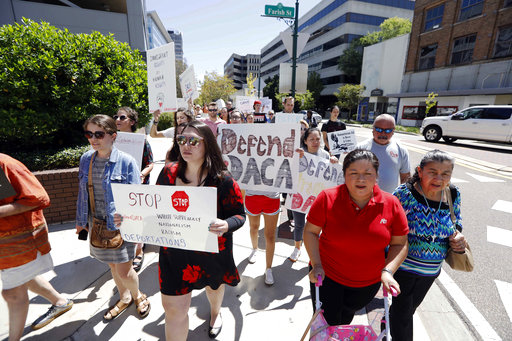Will Trump End Still Another Immigrant Protection Program?
A cut could be looming for hundreds of thousands of U.S. residents now shielded by "temporary protected status." Protesters representing various human rights organizations, immigrants, students and DACA recipients march to the federal building in downtown Jackson, Miss., on Friday. (Rogelio V. Solis / AP)
Protesters representing various human rights organizations, immigrants, students and DACA recipients march to the federal building in downtown Jackson, Miss., on Friday. (Rogelio V. Solis / AP)
As Americans struggle with the potential repercussions of President Trump’s decision to end the DACA program, the Temporary Protected Status, or TPS program, which protects hundreds of thousands of undocumented immigrants, could become next on the administration’s chopping block. CNN writes:
At issue is “temporary protected status,” a provision of immigration law that allows the government to grant temporary work authorizations and protection from deportation to immigrants, including otherwise undocumented ones, from certain countries where life remains dangerous. Conditions that could merit the status include armed conflict and civil war, natural disasters, epidemics and “other extraordinary and temporary conditions.”
The status is intended to be temporary, but many of the designated countries have had their crises continue for years, resulting in certain groups’ protections lasting for decades.
In the next six months, the Trump administration will weigh whether to extend the status for several countries whose immigrants have lived in the United States for as long as 20 years — with a decision to end that status potentially upending their lives. All told, more than 440,000 people in the United States are protected by the program.
The TPS program is administered by the Department of Homeland Security and allows foreign nationals already in the United States from 10 countries to stay in America for a designated period of time. Not everyone from these countries automatically qualifies for the program—eligible people must show they have lived in the United States continually since a displacing event. Given that cracking down on immigration was a Trump campaign centerpiece, he has not been expected to extend the program to more people from more countries.
Several TPS charters are about to expire. U.S. Citizenship and Immigration Services (USCIS) told CNN that “The Secretary has made a determination and USCIS will publish a (Federal) Register Notice shortly.” However, no information about the decision has been issued. Federal law mandates a decision 60 days before a deadline, meaning that the government is overdue to issue a decision on Sudan and South Sudan. Haiti, Honduras and Nicaragua are approaching their charter expiration dates in January, so decisions will presumably be released in November.
Given President Trump’s harsh comments on Central Americans in the past, specifically in regard to the MS-13 gang, there is cause for concern that the program might be ended for Central Americans. There have also been calls from lawmakers to extend TPS to Caribbean nations hit by Hurricane Irma. The Miami Herald has obtained a draft of a letter to President Trump by lawmakers that states: “While Congress and the Administration work to provide relief for those affected by devastation from Irma in our own country, we must also support our friends in the Caribbean. As the storm moves away from the first-impacted islands, the casualty toll is slowly rising as deaths have been reported in Barbuda and Saint Martin. The economies of the affected areas have been completely destroyed and will take years to rebuild.”
Additionally, there are economic concerns for revoking the program. CNN writes:
An analysis by the Immigrant Legal Resource Center, which advocates for pro-immigration policies, found that deporting all the immigrants from El Salvador, Honduras and Haiti who have temporary protected status would cost $3.1 billion and take away $6.9 billion in contributions to Social Security and Medicare and $45.2 billion to the gross domestic product over a decade. Turnover costs for their employers would total nearly $1 billion.
“There’s different elements to the concern,” said Rep. Zoe Lofgren, a Democrat from California. “First, in the case of people who’ve been here a considerable period of time, people become members of their community, and so … a couple decades later, you own businesses, you have families, you have grandchildren, you’re kind of part of our situation here.”
Lofgren said the designated countries often remain in dire straits, and sending people back to them would be “unwise.”
Lofgren also says there should be a change in federal immigration law to help transition TSP immigrants who have lived in the United States for a long period, have lived in the country with legal status or have made contributions to their communities.
Your support matters…Independent journalism is under threat and overshadowed by heavily funded mainstream media.
You can help level the playing field. Become a member.
Your tax-deductible contribution keeps us digging beneath the headlines to give you thought-provoking, investigative reporting and analysis that unearths what's really happening- without compromise.
Give today to support our courageous, independent journalists.






You need to be a supporter to comment.
There are currently no responses to this article.
Be the first to respond.